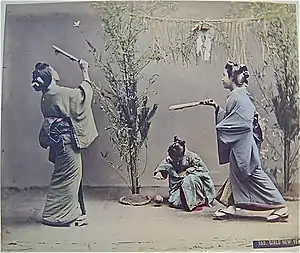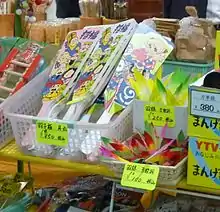Hanetsuki
Hanetsuki (Japanese: 羽根突き or 羽子突き) is a Japanese traditional game, similar to racket games like badminton but without a net, played with a rectangular wooden paddle called a hagoita and a brightly coloured shuttlecock, called a hane.[1] Often played by girls at the New Year, the game can be played by any gender in two fashions: by one person attempting to keep the shuttlecock aloft as long as possible, or by two people batting it back and forth. Players who fail to hit the shuttlecock get marked on the face with India Ink. Traditionally, the longer the shuttlecock remains in the air, the greater protection from mosquitoes the players will receive during the coming year. Although hanetsuki is not as popular as it used to be, decorative hagoita are commonly sold throughout Japan.


The game is also known as Oibane (追い羽根, 追羽根, or 追羽子).[2][3][4]
Hagoita often have pictures of kabuki theatre performers or celebrities on them.
At the beginning of the game's development, soapberry nuts were often used as shuttlecocks.
See also
References
- "Hanetsuki". Japan Guide. 2002-12-03. Retrieved 2021-01-21.
- "WWWJDIC: Online Japanese Dictionary Service". Electronic Dictionary Research and Development Group. Retrieved 11 January 2022.
- The Kanji Dictionary, Spahn & Hadsamitzky, Tuttle, 1996
- "Kikuko's Website: Hagoita/Hanetsuki". kikuko-nagoya.com. Retrieved 2021-05-28.